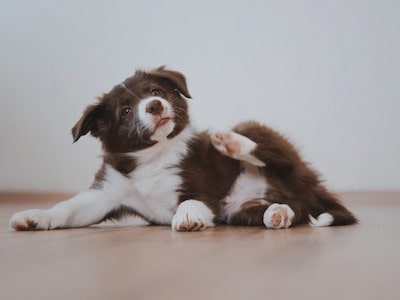Dogs are known for their boundless energy and playful behavior. However, sometimes their enthusiasm can lead to accidents and injuries. When a dog sustains a wound, it’s important to take quick action to prevent them from scratching the area.

Scratching a wound can cause further injury and infection, making the healing process more difficult and painful for your furry friend. In this article, we’ll explore why dogs scratch wounds, and provide practical tips and strategies to prevent them from doing so.
From using Elizabethan collars to positive reinforcement training, we’ll cover a range of methods to help keep your dog comfortable and promote speedy healing. Whether you’re a new dog owner or a seasoned pro, these strategies will help you protect your pup and ensure their wounds heal properly.
Why do dogs scratch their wounds?
Dogs have a natural tendency to scratch at wounds and injuries, which can make the healing process more difficult. Understanding why dogs scratch wounds can help you address the behavior and prevent further injury. Here are some reasons why dogs may scratch their wounds:

- Instinctual behavior: Dogs have an innate instinct to lick and groom themselves as a way of cleaning and maintaining their fur. Scratching an itchy wound may be an extension of this behavior, as they may be trying to remove any foreign material from the affected area.
- Anxiety or discomfort: Dogs may scratch their wounds due to anxiety or discomfort, especially if the wound is painful or uncomfortable. In some cases, dogs may scratch at wounds as a coping mechanism to deal with stress or anxiety.
- Medical conditions: Certain medical conditions such as allergies, skin infections, and parasites can cause dogs to scratch at their skin excessively, which can then lead to wounds. Dogs with arthritis or other mobility issues may also accidentally scratch themselves more frequently, as they may have difficulty moving around.
- Boredom or lack of stimulation: Dogs who are bored or lack mental stimulation may scratch themselves out of habit or as a way to release pent-up energy.
- Habit: In some cases, dogs may simply develop a habit of scratching themselves, especially if the wound is in an easily accessible spot or if they have been scratching at the area for a prolonged period of time. Over time, this habit can become deeply ingrained, making it difficult to break.
Tips to Prevent Your Dog from Scratching Wound
Here are some strategies to prevent dogs from scratching wounds:

- Use an Elizabethan collar (E-collar): An E-collar, also known as a “cone of shame”, is a plastic cone-shaped device that fits around your dog’s neck, preventing them from accessing their wound. While E-collars may be uncomfortable for your dog, they are an effective way to prevent scratching and allow wounds to heal.
- Cover the wound with a bandage or dressing: Depending on the location and size of the wound, you may be able to cover it with a bandage or dressing to prevent your dog from scratching it. However, make sure the bandage or dressing is secure and does not cause any discomfort or irritation to your dog.
- Use deterrent sprays: Deterrent sprays are a safe and effective way to discourage dogs from scratching at wounds. These sprays contain bitter-tasting substances that make the wound less appealing to your dog. Be sure to test the spray on a small area first to ensure your dog does not have an adverse reaction.
- Provide distractions and mental stimulation: Giving your dog toys, treats, and other forms of mental stimulation can help distract them from scratching their wound. Puzzle toys, chew toys, and interactive toys are great options for keeping your dog engaged and occupied.
- Supervise your dog: Keeping a close eye on your dog and intervening when they try to scratch their wound is essential to prevent further damage. If you notice your dog scratching or licking their wound, distract them with a toy or treat, or gently move them away from the area. This can help break the habit and prevent them from causing further injury.
FAQs
Why is it important to prevent my dog from scratching their wound?
Scratching a wound can cause further injury and infection, making the healing process more difficult and painful for your dog. It can also delay the healing process and lead to scarring.
Should I clean my dog’s wound before applying a deterrent spray?
Yes, it’s important to clean your dog’s wound before applying any type of spray or ointment. Use a mild soap and warm water to gently clean the area, and pat it dry with a clean towel. This will help prevent infection and ensure the spray is effective.
Can I use a human anti-itch cream on my dog’s wound?
No, you should never use human anti-itch creams or ointments on your dog’s skin, as they may contain ingredients that are toxic to dogs. Always consult with your veterinarian before applying any medication to your dog’s skin.
Can I train my dog to stop scratching their wounds?
Yes, positive reinforcement training can be an effective way to teach your dog to avoid scratching their wounds. Reward your dog with treats and praise when they refrain from scratching their skin, and redirect their attention to toys or other forms of stimulation when they do start to scratch.
Conclusion
In conclusion, preventing your dog from scratching a wound is crucial to ensure that it heals properly and without complications. Using an Elizabethan collar, covering the wound with a bandage or dressing, and providing distractions and mental stimulation are some effective strategies to keep your dog from scratching their skin.
It’s also important to consult with your veterinarian if your dog is experiencing discomfort or if the wound is not healing properly. By taking these steps, you can help your dog recover from their injury and prevent further damage to their skin.

Corey is the founder of DogNeedsBest, and her motive behind this website is to provide a platform where pet parents can get free access resources that would them in petting dogs in a better way. She spends her free time taking care of pets at shelter homes of abandoned animals. Corey also donates a certain portion of her wealth to pet shelter homes in Miami, Naples, and Tampa.

